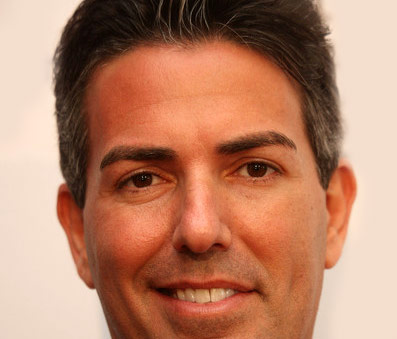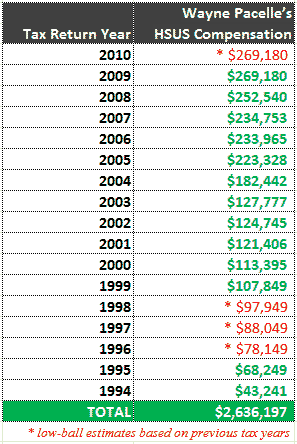Meet the 2.6 Million Dollar Man

Many of you, after looking at the evidence, agree with us that there’s a lot of room for improvement at the Humane Society of the United States. HSUS shares shockingly little of its donors’ money with pet shelters. It’s really more concerned with its own animal rights agenda.
HSUS doesn’t have many defenses for these facts. Instead of engaging in open discussion, they just attack their critics. HSUS calls critics defenders of animal abuse. And a favorite tactic of CEO Wayne Pacelle is to act as if opponents are just hacks of “industry”—essentially implying they’re only motivated by money. (The word “industry” turns up 466 times on Pacelle’s blog.)
It’s totally shameless, but that’s the kind of people in charge at HSUS. Where there’s no defense, they simply accuse opponents of profit-mongering. It’s an outrageous smear on animal lovers who simply want accountability and change.
Lately Pacelle has been complaining publicly about the way this blog’s parent organization is run. Unlike HSUS, we operate with remarkable efficiency by contracting out some of our more expensive day-to-day expenses to a management firm, essentially sharing costs with other organizations. Pacelle seems to think this means the people running HumaneWatch are capturing huge sums of money in the process.
This is nonsense. It’s a shame Pacelle, who makes more than a quarter-million dollars a year, doesn’t have a basic understanding of business economics.
Here’s the short course, Wayne: “Revenue” is not the same thing as “income.” Expenses like rent, advertising, web hosting, and human resources get deducted from revenue. And our organization has only about one-fortieth as much as yours.
The long course is a little more complicated, so we’re offering Pacelle his choice of two books, on us. He can choose either Managerial Economics and Business Strategy or the paperback version of The New Totally Awesome Business Book for Kids. The first book is available for the Kindle, but the second one has more pretty pictures.
We’re confident Pacelle already knows a thing or two about income, since he collects so much of it. We’re publishing some new data today that might make some of his employees wonder if the Big Boss is really worth the millions HSUS has paid him.
The HumaneWatch Document Library now contains every tax return HSUS has filed since Wayne Pacelle was hired in 1994. (They were all signed under penalty of perjury.) With three exceptions, these documents list Pacelle’s income and the value of his benefit package. Assuming his salary increases during those three “missing” years were steady (as opposed to sudden), Pacelle personally took more than $2.3 million out of HSUS through the end of 2009.

HSUS hasn’t filed its 2010 tax return yet. But assuming Pacelle didn’t take a pay cut last year, his personal take is now more than $2.6 million.
Will Pacelle’s total HSUS earnings top $3 million by the end of 2011? It’s quite possible.
The chart at left lists his compensation numbers for the last 17 years, including his $269,180 compensation package during 2009. The “starred” numbers in red are our low-ball estimates, based on the compensation totals that appear before and after.
Make no mistake: $2,636,197 is a lot of doggie-dollars. It’s nice work if you can get it. And this doesn’t include the money Pacelle previously earned as Executive Director of The Fund For Animals—a group whose later merger with HSUS he engineered.
It seems clear that Wayne Pacelle is all about the Benjamins, and not so much about the Benjis. Under his leadership, HSUS has been socking $160 million away for future animal rights initiatives and recklessly playing the overseas markets. Meanwhile, hands-on pet shelters are left with table scraps—when HSUS isn’t charging them $25,000 a pop for “evaluations,” that is.
The next time Wayne Pacelle points a finger at his political opponents and claims they’re motivated by money, someone should remind him to check his own pay stub.



